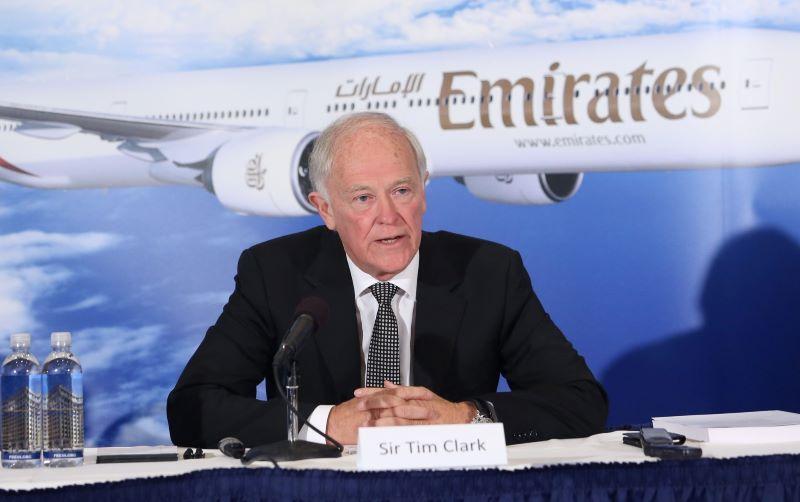
Emirates President Tim Clark says he wishes well the planned new Saudi Arabian airline Riyadh Air but believes the Saudi government’s ambitions for a greatly expanded aviation and tourism industry should focus on serving the needs of the kingdom.
Clark, who is the 2023 ATW Lifetime Achievement Award recipient, was a guest on Aviation Week’s Window Seat podcast this week talking about his career and industry views. The interview was done just days after Saudi crown prince Mohammed bin Salman formally launched Riyadh Air and named former Etihad Airways CEO Tony Douglas as the person who will head the new carrier. Saudia and Riyadh Air also announced orders this week for up to 121 Boeing 787s—Saudia buying a mix of 39 -9s and -10s with options for 10 more aircraft, while Riyadh Air ordered 39 -9s with options on 10 more.
The deals are part of Saudi Arabia’s Vision 2030 to create a global aviation hub similar to that achieved in Dubai with Emirates.
Asked for his thoughts on the plan, Clark, who still keeps the original blueprint for Emirates in his desk, said, “Saudi Arabia, if it continues down this path, which has a mega trillion-dollar spend coming up, is trying to transform itself from where it was to where it thinks it should be. There are many facets of that transformation.”
Clark said for Saudi Arabia to make it work, they should do it a bit like Dubai did when they set up Emirates in 1985.
“The ruler of Dubai, Sheik Mohammed bin Rashid Al Maktoum, who also the vice president of the UAE, had a vision with regards to where he thought Dubai needed to be and what he wanted to do, but he understood the criticalities of air access. Because, to get to Dubai, there’s no other way you can do it. It’s unlike Europe, where the hubs are served by rail,” Clark said. “We were very flattered when the crown prince of Saudi Arabia said, ‘I want an Emirates not in 38 years, but in seven years.’”
Clark added that he is “great friends” with Douglas.
“I kind of wish them well,” he said. “Do I see it as a competitive force for what we do over here? If they are aspiring to create a mega hub on the lines of Dubai, my advice would be to concentrate on serving the needs of the kingdom, where they’re talking about getting 100 million visitors in the future per year and concentrate on doing that. That serves a need rather than trying to be a super hub, because the complexities of a super hub are very much an unknown. A lot of people think they can do it ... It really does take a lot of hard work to get it to work easily.”
Clark said that in general, he sees the demand for air travel post-pandemic continuing to grow, as it did after previous global crises.
“We are past the point where people will not travel because of budgets etcetera, so there is a genuine interest to go and explore, investigate, trade, whatever it was," Clark said. "That’s never going to change. That’s already there. We passed that. On our [computer] screens, we can see anything and everything and in the online world we can get anything we want, do anything we want in the travel domain; it’s hugely personalized. It’s luring you to travel whether you like it or not, so I say this is likely to continue unabated.”
But Clark cautioned that growing capacity to meet that increased demand is more costly in an industry that is now more financially risk adverse and debt laden.
“The supply calculus has changed quite significantly. As a result of that, you see constant prices rises,” Clark said. “The costs of the aircraft and propulsion have risen significantly because of inflation. Interest rates have risen significantly. Buying an aircraft in terms of the ownership of it and the debt you’ve got to provide for it and the cost of that debt now appear as significant issues on your bottom line on top of fuel being as high as it is.”
Clark, who said in 2019 that he would retire but postponed that because of the pandemic, said that he still has “lots of ideas about new products for the airline.”
In Dubai, which now has close to 4 million residents, Clark says there is potential to double the size of the hub on which Emirates is founded over the next 10 years, although the additional capacity would need to be built somewhere “further south.”

